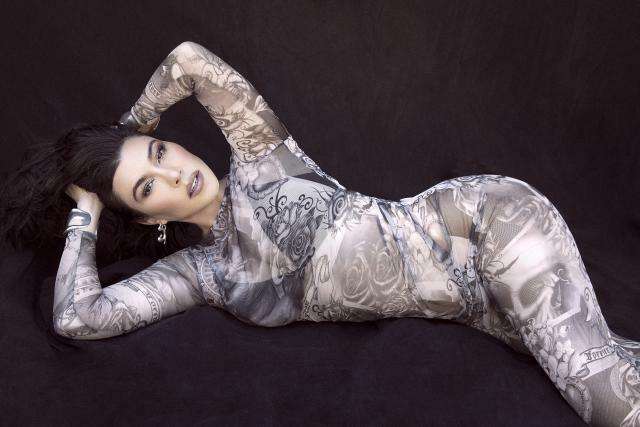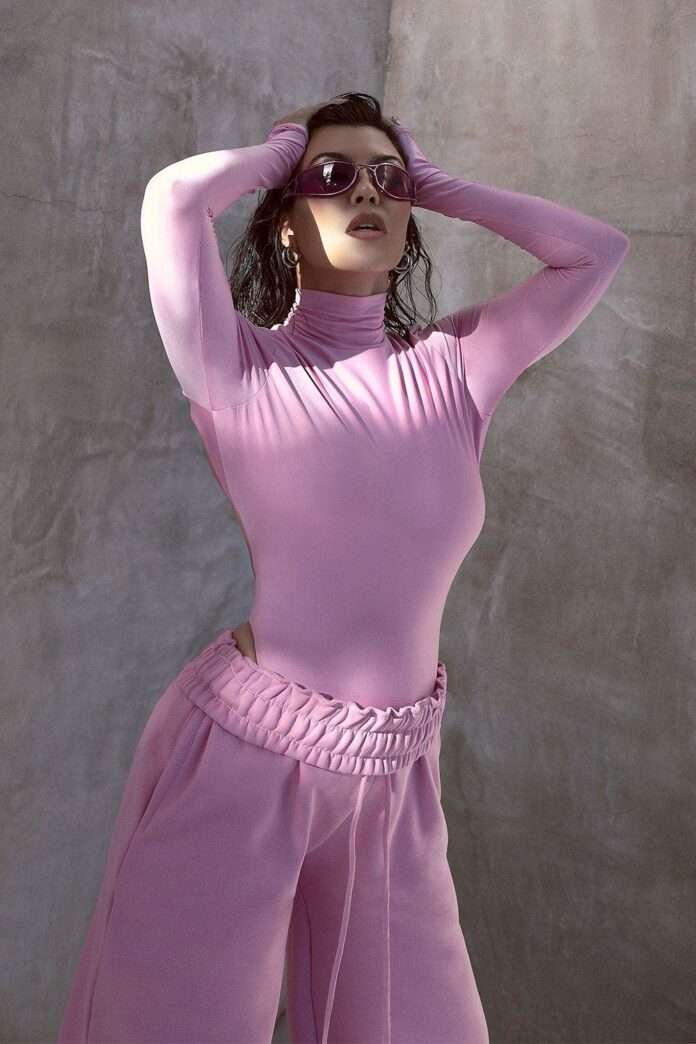Earlier this month, Kourtney Kardashian Barker and fast-fashion retailer Boohoo, announced a partnership to promote the brand’s latest sustainable offerings.
Boohoo and Kardashian Barker will release two capsule collections that the retailer says have been created “in tandem with a journey of investigation into opportunities for creating a more sustainable fashion future.” The first collection, which launched this month, includes 46 pieces that Boohoo says was in development for a year. It includes vintage pieces as well as garments made from recycled fibers, traceable cotton, and “cleverly designed multiway pieces that give customers a variety of styling options.” Outerwear features leather made from recycled polyester and recycled sequins.
“Although these improved fabric options are not the perfect solution, customers are given clear information about how their garments are made, offered options in terms of how they might access these pieces, and also provided with a free Kares document to help them extend the life of their purchases,” the company said in a press release.
“When Boohoo first approached me with this idea that was all about sustainability and style, I was concerned about the effects of the fast fashion industry on our planet,” Kardashian Barker said in a statement. “Boohoo responded with excitement and a desire to incorporate more sustainable practices into our line.”
Kardashian Barker said she spoke with industry experts, calling it “an enlightening experience.” She also said she was grateful for the opportunity to use her platform to “drive conversations that lead to ongoing change.”
Carol Kane, co-founder and executive director of Boohoo Group also shared enthusiasm over the partnership’s impact.

“We all know there’s an environmental and social cost to producing clothes, but there are ways the fashion industry can be smarter.” Kane said Boohoo has taken “the bold decision” to listen to its customers’ request for more sustainable choices.
While it sounds like progress, the move has earned a number of criticisms because of the company’s past.
Boohoo greenwashing
Boohoo has been called out for its use of forced labor, with the fashion advocacy organization Remake saying its workers in Leicester, U.K. make on average, about £3 per hour ($3.43 USD). The organization found evidence of some workers earning as little as £1 per house. A 2020 investigation also found the company’s Leicester factories committed furlough and tax fraud, forced workers into “unhygienic” work environments during covid lockdown, and withheld necessary documents migrant workers needed to report workplace abuse.
The company scored 5 out of 100 possible points on the Remake Brand Directory for sustainability and ethics.
Last month, along with several other retailers, Boohoo was the target of an investigation over claims it was greenwashing and misleading consumers.
The Competition and Markets Authority (CMA) looked specifically at statements made by the brand on websites and in marketing having historically been too broad and vague.
“Making false misleading claims in advertising is a serious matter and results in negative publicity for the businesses involved, as well as reputational damage and having difficulties engaging consumers with future advertising campaigns,” Sarah Cardell, interim chief executive of the CMA, said in a statement.
“Consumers are becoming more and more aware of their social responsibility toward saving the environment and putting trust in companies claiming their goods are ‘green’, ‘carbon neutral’ and ‘eco-friendly.’ Advertising, particularly on social media, has a direct impact on how we all behave and make choices about purchasing ‘green’ products.”
‘Poor quality and mass production will never be sustainable’
Ana Kannan, CEO of Toward, a sustainable online retailer, says Boohoo’s latest initiative is just another example of greenwashing because it makes “a shallow attempt to change the narrative around the brand’s negative environmental impacts,” she told Ethos via email.
According to Kannan, Kardashian Barker lacks a background in sustainability, and was only launched in direct response to the recent investigation earlier this summer, “and it’s clear that they’re scrambling to publicly reposition to address possible concerns about their sustainability practices,” she says.
“Poor quality and mass production will never be sustainable,” Alexandra Milstein, founder of the plastic-free label Mill & Moss told Ethos via email.
Milstein says rather than seeing Boohoo paying for a “greenwashing campaign,” she would prefer to see their factory workers paid. “The CEO of Patagonia is creating real change—this is just another ploy to sell more.” Yvon Chouinard, the founder of Patagonia, made headlines last week when the company announced he had transferred ownership to a newly formed trust charged with distributing profits to organizations working to protect the planet.
“If Kardashian Barker really wanted to make a difference, she’d push Boohoo to think beyond surface-level sustainability for marketing purposes and challenge them to create a more transparent supply chain and ethical working environment, while ensuring that their production practices impact on the planet is being considered in every step of producing their garments,” Kannan says.
Kannan says one easy way to spot greenwashing is when a company launches a sustainable collection as a one-off instead of an overarching shift to its entire value chain. She also points to buzzwords, like “sustainability” and “eco,” which can be both signs of greenwashing and meaningful efforts alike.
Instead, Kannan says people should look to brands that engage in responsibility, “a more holistic approach to the environmental impact of the fashion industry that accounts for the materials used to produce clothes, the ethics of the factories that make them, and the impact on people and animals associated with their existence.”
Kardashian Barker responded to the criticism in a recent Instagram post.
“I went back and forth about doing this collection with [Boohoo] because the first thing I think about when I hear the words ‘fast fashion’ is that it’s bad for our planet,” she wrote.
“Boohoo approached me to be a sustainability ambassador, and though I knew it would get backlash because the two just don’t go hand in hand, I thought about the fact that fast fashion, or the fashion industry in general, isn’t going anywhere. I thought about the attention this collaboration would bring to people who may otherwise have no idea about the impacts of fast fashion on our planet. I thought about how pushing Boohoo to make some initial changes and then holding them accountable to larger change would be impactful. It’s definitely making some noise which is exactly what I was hoping for.
“I certainly don’t have all the answers, but for someone who has done a fast fashion line collaboration in the past, which didn’t get backlash because I was not calling attention to trying to make better changes, I feel proud about doing it with intention and purpose,” she wrote.
Milstein says a truly sustainable brand might include limited production runs because they’re designed to limit waste. And she says brands like Mill & Moss that are sustainable across their entire supply chain are also often transparent about every step of the business, “because we are not afraid to disclose our partners.”
Kannan says the backlash is perhaps the best thing to come out of the collaboration because it has “sparked a conversation and encouraged people to think more critically about their purchasing habits.”
Kardashian Barker too is stepping lightly forward.
“There’s still lots of work to be done and improvements to be made, but I truly believe that any progress we can make when it comes to sustainability is a step in the right direction and will open up the conversation for future advancements.”


